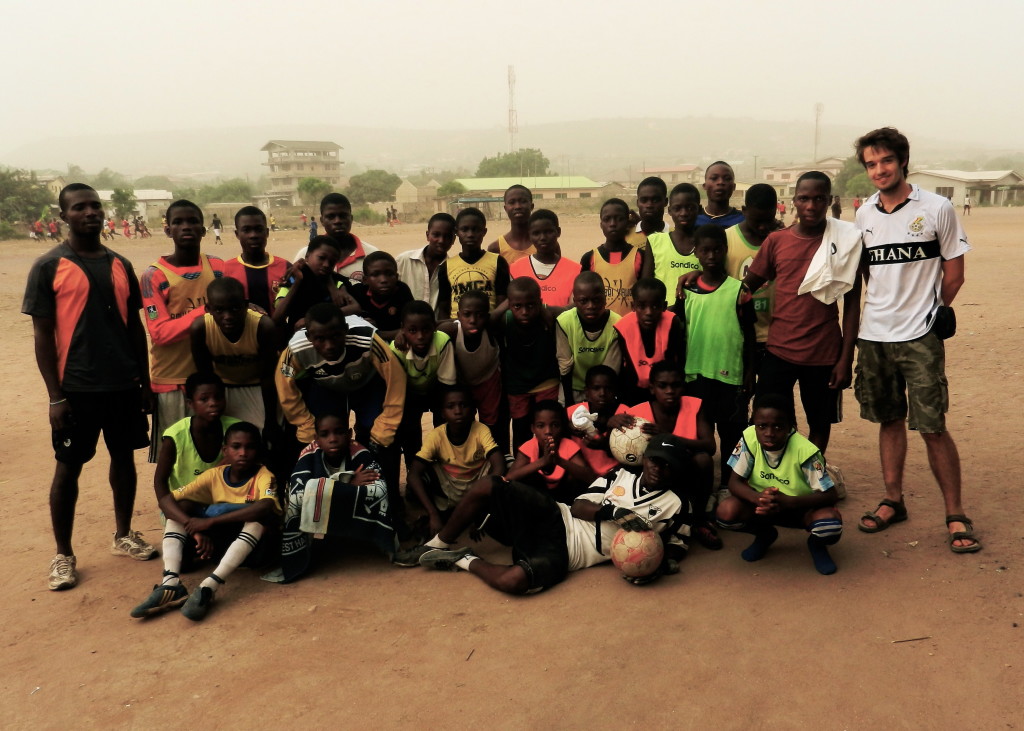A guest post by Oskar Butcher.
“Look, I’m here to try and help you learn. If that’s not what you’re here for, then feel free to leave.”
Standing before a dusty classroom filled with 55 Ghanaian children aged between 10 and 16 – their only teacher for the next three days – I was a little out of my depth.
The room quietened somewhat, nobody left.
***
Two years studying International Development and one year working with a development firm has given me space to reflect critically on my short time in Ghana, and the voluntourism industry itself.
One thing is clear: teenagers fresh out of their A-level exam halls are not going to put an end to poverty.
Some commentators go so far as to suggest that ‘voluntourism’ does more damage than good. Two key criticisms are that it leads to increased local unemployment and that it irresponsibly allows volunteers to do tasks they would otherwise be unqualified to do.
Let me be clear about my own motivations for volunteering. Whilst I primarily hoped to make a positive impact, I was also seeking a sense of adventure and an opportunity to ‘see the world’. This is clearly a major factor for many short-term international volunteers and explains why so many pay vast sums each year and fly across the globe to do so. Put simply, a project in Africa is more exotic, exciting, and ‘glamorous’ than the homeless shelter down the road. Consequently, the voluntourism industry has grown vastly in recent years, with many organisations charging upwards of £2,000 for a two-week volunteering stint.
Uncomfortable with many of these organisations and the accompanying price tag, in 2012 I set about finding a small, African-based not-for-profit organization online and contacted the founder. Ten e-mails later and my flights were booked: I was going to coach sports in Ghana.
Two months later, Peter, the NGO’s founder, picked me up from the Accra international airport around 6AM, and drove me to Kokrobite – a ramshackle seaside town and my home for the next 5 weeks. Peter left within 30 minutes of arriving, saying, “Call me if you need anything, I’m heading back to Accra.”

As the sole volunteer in Kokrobite, I was thrown far out of my comfort zone. The NGO effectively consisted of the local football coach and myself. I was totally committed to the children I was coaching, and even began working at the local school outside of coaching hours.
Within two weeks, I had a class of over 50 children to myself. (“I’ll be at teacher training for the next few days, you know what you’re doing, don’t you? If you can’t make it, don’t worry.”) It was difficult, but in many senses I learnt more in that short period than one could hope to in a far longer time at any university – about development, about myself, and about adapting and making do.
Despite a number of differences between my volunteering experience and that of many others, there is one overarching similarity: I, the volunteer, was the primary beneficiary of my volunteering. I had an incredible trip and gained a wealth of CV-enhancing experience. However, I coached football with only a basic basketball coaching qualification, and I taught with no formal teacher training.
This is where a shift in the volunteering industry’s focus is required. Whilst volunteering should be a mutually beneficial interaction, the focus needs to be on supporting quality programmes that contribute towards an inclusive and sustainable impact for the communities they serve. The current emphasis of many organisations is all too often disproportionately geared towards providing a service for the volunteers, who are predominantly viewed as customers.
The ever-increasing gap-year volunteering industry is testament to the fact that thousands of well-intentioned young people want to help those in need and instigate positive change around the world. Like myself, many will work in their home countries in order to self-fund the trip, wanting to contribute directly, but also seeking travel, adventure and personal development in the same breath. Having benefited greatly from my own life-changing volunteering stint, which I do believe was of some benefit to the children I taught, I couldn’t possibly dissuade others from seeking the same.
Throwing criticism at voluntourism is not only unproductive, but also risks disillusioning (or even demonizing) well-meaning young people. Large numbers of engaged young people should surely be a source of optimism. What is required from the development community is a pragmatic approach to integrate these volunteer resources into on-going programmes that nurture sustainable development.
Let’s find a space where meaningful partnerships between volunteering organisations and traditional development actors (local or international) can be built.
***
Oskar Butcher is a currently studying his BSc in Social Sciences, focusing on International Development and Politics, at the University of Bath. His core interests lie in good governance and its potential for improving aid accountability and effectiveness.
***
Related Posts
When the protagonist isn’t a white kid
Helping hands, ignoring demands: The contemporary approach to development?
America’s budding professionals: Well-traveled and ready to save the world
Ruminating on the Radio: Advice for International Volunteers


Pingback: Volunteering: “the road to hell is paved with good intentions” — WTM Responsible Tourism Blog
Pingback: Volunteering: “the road to hell is paved with good intentions” - wheeliesvanrentals.com
Pingback: Volunteering: “the road to hell is paved with good intentions” | Travel Industry Blog, Reports, Press Releases | WTM London
Pingback: Volunteering: "the road to hell is paved with good intentions" | WTM Insights